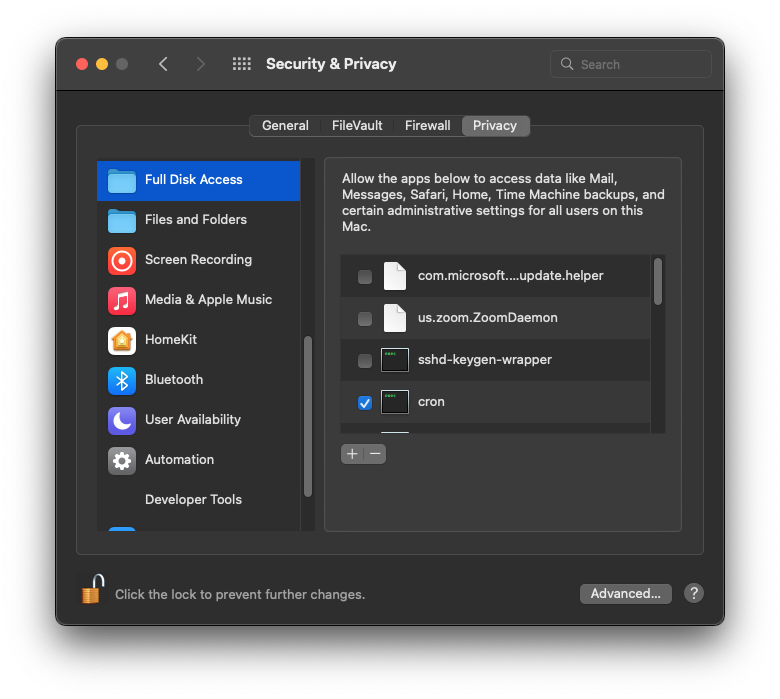When integrating NetSuite with external monitoring systems, you often need scripts that run at regular intervals. Recently, we helped a client set up automated data extraction from NetSuite to Datadog using Python scripts and Crontab on macOS. Here's what we learned.
The Use Case
Our client needed to:
- Call a NetSuite RESTlet every 5 minutes
- Extract JSON data from Saved Searches
- Post the results to Datadog for monitoring
The solution? Python scripts automated with Crontab. But on macOS 12.5 and later, there's a security hurdle to overcome.
The Challenge: macOS Security
Modern macOS versions have enhanced security features that prevent Cron from accessing files without explicit permission. When you try to run Python scripts via Crontab, they simply won't execute unless you grant Cron "Full Disk Access."
Enabling Cron on macOS
Here's how to grant the necessary permissions:
Step 1: Open System Preferences
Navigate to System Preferences from your Apple menu or Dock.
Step 2: Access Security Settings
Go to Security & Privacy → Privacy tab → Full Disk Access
Step 3: Add Cron

- Click the lock icon to make changes (you'll need administrator privileges)
- Click the + button
- Navigate to
/usr/sbin/cron - Add it to the list
- Ensure the checkbox next to cron is checked
Setting Up Your Crontab
Once Cron has the necessary permissions, you can configure your scheduled tasks. Here's the configuration we used:
# Edit crontab
crontab -e
# Add these lines to run scripts every 5 minutes
*/5 * * * * /usr/bin/python3 /Users/clientsUserName/py/netsuite_transactions.py
*/5 * * * * /usr/bin/python3 /Users/clientsUserName/py/google_analytics_transactions.py
*/5 * * * * /usr/bin/python3 /Users/clientsUserName/python/netsuite_saved_searches.py
Understanding the Crontab Syntax
The */5 * * * * pattern means:
*/5- Every 5 minutes- First
*- Every hour - Second
*- Every day of the month - Third
*- Every month - Fourth
*- Every day of the week
Best Practices for Crontab
- Use Absolute Paths: Always use full paths for both the Python interpreter and your scripts
- Log Output: Redirect output for debugging:
*/5 * * * * /usr/bin/python3 /path/to/script.py >> /path/to/logfile.log 2>&1 - Test First: Run your scripts manually before adding to crontab
- Environment Variables: Cron runs with minimal environment. Set any needed variables in your script
Security Considerations
Important Warning: Granting Full Disk Access to Cron is not a secure long-term solution. This approach should only be used as a temporary quick-fix. Here's why:
Security Risks
- Cron with Full Disk Access can run any script with elevated privileges
- Compromised scripts could access sensitive system files
- No granular control over what Cron can access
Better Alternatives
For production environments, consider:
- Launch Agents/Daemons: macOS-native scheduling with better security controls
- Dedicated Monitoring Servers: Run extraction scripts on dedicated Linux servers
- NetSuite's Built-in Scheduling: Use SuiteScript scheduled scripts where possible
- Containerized Solutions: Docker containers with proper security boundaries
- Cloud Functions: Serverless functions triggered by cloud schedulers
Example Python Script Structure
Here's a basic structure for the NetSuite extraction scripts:
#!/usr/bin/env python3
import requests
import json
import os
from datetime import datetime
# NetSuite RESTlet configuration
NETSUITE_ACCOUNT = os.environ.get('NETSUITE_ACCOUNT')
RESTLET_URL = os.environ.get('RESTLET_URL')
TOKEN = os.environ.get('NETSUITE_TOKEN')
# Datadog configuration
DATADOG_API_KEY = os.environ.get('DATADOG_API_KEY')
DATADOG_APP_KEY = os.environ.get('DATADOG_APP_KEY')
def fetch_netsuite_data():
"""Fetch data from NetSuite RESTlet"""
headers = {
'Authorization': f'Bearer {TOKEN}',
'Content-Type': 'application/json'
}
try:
response = requests.get(RESTLET_URL, headers=headers)
response.raise_for_status()
return response.json()
except Exception as e:
print(f"Error fetching NetSuite data: {e}")
return None
def send_to_datadog(data):
"""Send metrics to Datadog"""
# Implementation for Datadog API
pass
if __name__ == "__main__":
data = fetch_netsuite_data()
if data:
send_to_datadog(data)
print(f"Successfully processed at {datetime.now()}")
Troubleshooting Common Issues
Scripts Not Running
- Check Cron service is running:
sudo launchctl list | grep cron - Verify Full Disk Access is granted
- Check script permissions:
chmod +x your_script.py - Review system logs:
log show --predicate 'process == "cron"' --last 1h
Environment Issues
- Cron runs with PATH=/usr/bin:/bin
- Set full paths or update PATH in your script
- Source required environment variables explicitly
Permission Errors
- Ensure the user's crontab has access to all required files
- Check Python library installations for the correct user
Monitoring Your Scheduled Jobs
To ensure your scripts are running successfully:
- Log Files: Always log script execution and errors
- Email Notifications: Configure cron to email output:
MAILTO=your-email@example.com - Monitoring Alerts: Set up Datadog alerts for missing data
- Health Checks: Implement heartbeat monitoring
Conclusion
While using Crontab on macOS for NetSuite integration requires jumping through security hoops, it can serve as a quick solution for development or temporary needs. However, for production use, we strongly recommend more secure alternatives.
Remember:
- Full Disk Access for Cron is a security risk
- Use this approach only for development or temporary solutions
- Implement proper logging and monitoring
- Plan migration to a more secure solution
Need help with NetSuite monitoring or integration? Contact Contra Systems for professional NetSuite monitoring services that prioritize security and reliability.